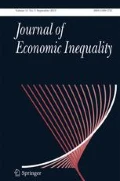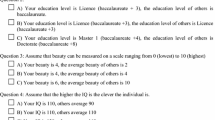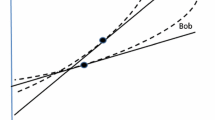Abstract
This paper briefly and informally surveys different theoretical models of relative concerns and their relation to inequality. Models of inequity aversion in common use in experimental economics imply a negative relation between inequality and happiness. In contrast, empirical studies on happiness typically employ models of relative concerns that assume that increases in others’ income always have a negative effect on own happiness. However, in these latter models, the relation between inequality and happiness can be positive. One possible solution is a rivalry model where a distinction is made between endowment and reward inequality which have respectively a negative and positive effect on happiness. These different models and their contrasting results may clarify why the empirical relationship between inequality and happiness has been difficult to establish.
Similar content being viewed by others
References
Abel, A.B.: Asset pricing under habit formation and catching up with the Joneses. Am. Econ. Rev. 80(2), 38–42 (1990)
Alesina, A., di Tella, R., MacCulloch, R.: Happiness and inequality: are Europeans and Americans different? J. Public Econ. 88, 2009–2042 (2004)
Becker, G.S., Murphy, K.M., Werning, I.: The equilibrium distribution of income and the market for status. J. Polit. Econ 113(2), 282–310 (2005)
Blanchflower, D., Oswald, A.: Well-being over time in Britain and the USA. J. Public Econ. 88, 1359–1386 (2004)
Blanco, M., Engelmann, D., Normann, H.: A within-subject analysis of other-regarding preferences (2007, working paper)
Boskin, M.J., Sheshinski, E.: Optimal redistributive taxation when individual welfare depends upon relative income. Q. J. Econ. 92(4), 589–601 (1978)
Brown, G.D.A., Gardner, J., Oswald, A., Qian, J.: Does wage rank affect employees’ wellbeing? Ind. Relat. (2004, forthcoming)
Charness, G., Rabin, M.: Understanding social preferences with simple tests. Q. J. Econ. 117, 817–869 (2002)
Clark, A.E.: Inequality-Aversion and income mobility: a direct test. DELTA, Paris (2003, working paper)
Clark, A.E., Frijters, P., Shields, M.A.: Relative income, happiness and utility: an explanation for the easterlin paradox and other puzzles. J. Econ. Lit. (2007, forthcoming)
Clark, A.E., Oswald, A.J.: Satisfaction and comparison income. J. Public Econ. 61, 359–381 (1996)
Clark, A.E., Oswald, A.J.: Comparison-concave utility and following behavior in social and economic settings. J. Public Econ. 70, 133–155 (1998)
Cole, H.L., Mailath, G.J., Postlewaite, A.: Social norms, savings behavior, and growth. J. Polit. Econ. 100(6), 1092–1125 (1992)
Corneo, G.: The efficient side of progressive income taxation. Eur. Econ. Rev. 46, 1359–1368 (2002)
Corneo, G., Jeanne, O.: On relative wealth effects and the optimality of growth. Econ. Lett. 54, 87–92 (1997)
Corneo, G., Jeanne, O.: Social organization, status and savings behavior. J Public Econ. 70, 37–51 (1998)
Dasgupta, I., Kanbur, R.: Community and class antagonism. J. Public Econ. 91, 1816–1842 (2007)
Deaton, A.: Health, inequality and economic development. J. Econ. Lit. 41(1), 113–158 (2003)
Duesenberry, J.S.: Income, Saving and the Theory of Consumer Behavior. Harvard University Press (1949)
Easterlin, R.: Does economic growth improve the human lot? In: David, P.A., Reder, M.W. (eds.) Nations and Households in Economic Growth (1974)
Fehr, E., Schmidt, K.: A theory of fairness, competition, and cooperation. Q. J. Econ. 114, 817–868 (1999)
Fliessbach, K., et al.: Social comparison affects reward-related brain activity in the human ventral striatum. Science 318, 1305–1308 (2007)
Frank, R.H.: The demand for unobservable and other positional goods. Amer. Econ. Rev. 75(1), 101–116 (1985)
Frank, R.H.: The frame of reference as a public good. Econ. J. 107, 1832–1847 (1997)
Frank, R.H.: Luxury Fever: Why Money Fails to Satisfy in an Era of Excess. Free Press, New York (1999)
Frey, B., Stutzer, A.: What can economists learn from happiness research? J. Econ. Lit. 40, 402–435 (2002)
Friedman, D.: Conspicuous consumption dynamics. Games Econ. Behav. (2005, forthcoming)
Futagamia, K., Shibata, A.: Keeping one step ahead of the Joneses: status, the distribution of wealth, and long run growth. J. Econ. Behav. Organ. 36, 109–126 (1998)
Galí, J.: Keeping up with the Joneses: consumption externalities, portfolio choice, and asset prices. J. Money, Credit Bank. 26(1), 1–8 (1994)
Graham, C., Felton, A.: Inequality and happiness: insights from Latin America. J. Econ. Inequal. 4, 107–122 (2006)
Harbaugh, R.: Falling behind the Joneses: relative consumption and the growth-savings paradox. Econ. Lett. 53, 297–304 (1996)
Hopkins, E., Kornienko, T.: Running to keep in the same place: consumer choice as a game of status. Amer. Econ. Rev. 94(4), 1085–1107 (2004)
Hopkins, E., Kornienko, T.: Which inequality? The inequality of endowments versus the inequality of rewards (2007, working paper)
Ireland, N.J.: Optimal income tax in the presence of status effects. J. Public Econ. 81, 193–212 (2001)
Kanbur, R., Pirttilä, J., Tuomala, M.: Non-welfarist optimal taxation and behavioural public economics. J. Econ. Surv. 20(5), 849–868 (2006)
Kornienko, T.: A cognitive basis for cardinal utility (2004, working paper)
Layard, R.: Human satisfactions and public policy. Econ. J. 90, 737–750 (1980)
Layard, R.: Happiness: Lessons from a New Science. Penguin (2005)
List, J.: The behavioralist meets the market: measuring social preferences and reputation effects in actual transactions. J. Polit. Econ. 114(1), 1–37 (2006)
Luttmer, E.F.P.: Neighbors as negatives: relative earnings and well-being. Q. J. Econ. 120(3), 963–1002 (2005)
Marmot, M.: Status Syndrome. Bloomsbury, London (2004)
Parducci, A.: Category judgment: a range-frequency model. Psych. Rev. 72, 407–18 (1965)
Postlewaite, A.: The social basis of interdependent preferences. Eur. Econ. Rev. 42, 779–800 (1998)
Rayo, L., Becker, G.S.: Evolutionary efficiency and happiness. J. Polit. Econ. 115(2), 302–337 (2007)
Robson, A.: Status, the distribution of wealth, private and social attitudes to risk. Econometrica 60(4), 837–857 (1992)
Samuelson, L.: Information-based relative consumption effects. Econometrica 72, 93–118 (2004)
Shaked, M., Shanthikumar, G.J.: Stochastic Orders. Springer, New York (2007)
Stewart, N., Chater, N., Brown, G.D.A.: Decision by sampling. Cogn. Psychol. 53, 1–26 (2006)
Thistle, P.D.: Ranking distributions with generalized Lorenz curves. South. Econ. J. 56, 1–12 (1989)
Weisbach, D.A.: What does happiness research tell us about taxation? University of Chicago (2007, working paper)
Wilkinson, R.G., Pickett, K.E.: Income inequality and population health: a review and explanation of the evidence. Soc. Sci Med. 62, 1768–1784 (2006)
Yitzhaki, S.: Relative deprivation and the gini coefficient. Q. J. Econ. 93, 321–324 (1979)
Author information
Authors and Affiliations
Corresponding author
Additional information
I would like to thank Ravi Kanbur, Tatiana Kornienko and, especially, Andrew Oswald for very helpful comments. Any errors are mine.
Rights and permissions
About this article
Cite this article
Hopkins, E. Inequality, happiness and relative concerns: What actually is their relationship?. J Econ Inequal 6, 351–372 (2008). https://doi.org/10.1007/s10888-008-9081-4
Received:
Accepted:
Published:
Issue Date:
DOI: https://doi.org/10.1007/s10888-008-9081-4




